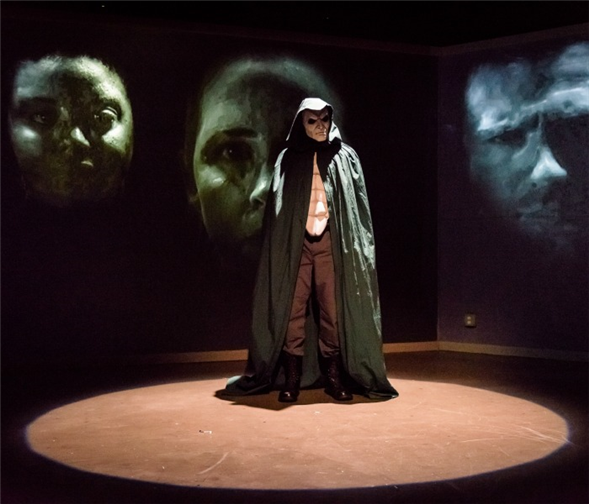Translate Page

A new theatre company spotlights artists who have emerged from poverty
---
There's a lot of talk about the need for diversity in theatre (and all the arts) these days. But usually those conversations focus on race, gender, and ethnicity -- rarely on class. As an emerging playwright who was raised in a very poor household, Joshua D. Young felt voices like his were being left out of the discussion. That's what inspired him to cofound The Playwriting Collective, a playwright-driven company devoted to dramatists and artists from lower-economic backgrounds. Young's genre-busting show Who Mourns for Bob the Goon? -- equal parts veteran support group drama, comic-book fantasy adventure, raunchy rom-com, and elegy for the forgotten -- is the troupe's inaugural production, opening this evening at HERE Arts Center.
Young believes it's important that he be frank about his challenged upbringing. However, the NYU graduate is quick to point out that, because of his particular family, he had it better than many of his peers. "My parents were indigent growing up but, ironically, very supportive and almost antagonistically like, 'If you want to do something, do it!'" he says. "Unlike other parents who might say, 'You've got to be a banker or a doctor or a lawyer,' they were like, 'Life is short, mostly miserable, the least you can try to do is something that you feel good about.'"
After two years of development, Young's Bob the Goon is finally center stage. The scribe believes it exemplifies The Playwriting Collective's mission by shedding light on the plight of young veterans of Iraq and Afghanistan, many of whom came from impoverished backgrounds and returned to civilian life with severe issues and inadequate care. "We still have people dying over there," Young says. "A lot of people that I know who are in the service come from the community I grew up in, and I have seen a lot of them return injured or with PTSD. It's something that my life in New York City is very removed from, but the premise is so personal to me."
The comic-book elements come into play since the vets are attending a therapy group because they identify with third-tier characters -- not heroes like Batman or Superman, but obscure folks like Dazzler, Mr. Gone, and Bob the Goon, who was a Joker henchman in Tim Burton's 1989 Batman movie. In some cases, they actually believe they are these alter egos, which inspires some truly spectacular fantasy sequences featuring incredible puppets (courtesy of James Ortiz of The Woodsman), colorful costumes, and eye-popping projections by Young, who's also a multimedia artist.
{Image1}
"When you're around these puppets it's so visceral," says Alicia Goranson. The stage and screen vet plays Langly, a former soldier who imagines herself as an anime character named Asuka. "It really taps into a child's part of you. To see these characters we grew up with -- whether they're from The Wizard of Oz or Elmo and Cookie Monster -- you can't help but be drawn in on a very primal level and go through some of those feelings you had as a kid: the awe and the fear and the terror and the joy. What Josh is saying is that disassociation isn't a general thing; it can be very, very specific. You look at the world today and it's a horrifying place. So when I see these people walking around playing Pokémon Go, well, that's disassociation, too. Everybody has their own escape. How we deal with reality and how we deal with denial is personal."
Although Bob the Goon is the title character, it's actually Langly who sparks most of the action. "This is the third play I've done about the wars in Iraq and Afghanistan," Goranson says, recalling her roles in the Public Theater's The Poor Itch by the late John Belluso and workshops of Alexandra Gersten-Vassilaros' Mean Time. "Even for many liberals, there's some kind of sensibility where people can't separate the war from the vets, an anger at the war that unfortunately falls on the soldiers. At the time that I did The Poor Itch, I wanted to do a big benefit for veterans. I reached out to local bands and nobody wanted to do it. I was extremely disappointed but it made me realize there's this gap. We need to remember all these soldiers who lost their lives at 18, at 20, all these young people who could have been part of our country's fabric and were lost. I think it's interesting how roles can find you, you know? Langly is a way for me to focus on the passion I have about this cause. Throughout the play, what's important to her is that these people aren't forgotten."
{Image2}
Considering that the two gunmen who assassinated police officers in Dallas, Texas and Baton Rouge, Louisiana earlier this month were both young veterans, Bob the Goon seems eerily timely. Who are these soldiers and, after they're finished battling on our country's behalf, who steps up to fight for them?
"I think it's extraordinarily interesting and speaks to something that is being neglected: the mindset of being trained to kill your enemy," says Young. "'I have an enemy and the enemy is cops so I'm going to shoot them.' There's an interrelationship with PTSD and the service."
"I understand why these individuals feel unrepresented," Goranson adds. "They feel like they did something overseas and they're not being taken care of, and that is a very, very serious issue. Of course I'm not condoning that violence, but if it happens time and again, you have to pay attention. And another thing: Cops also experience PTSD. They are stressed every single day, some more than others. How do we resolve this? How do we keep the people trying to regulate our society healthy?"
---
Follow Raven Snook at @RavenSnook. Follow TDF at @TDFNYC.
Photos by Steven Pisano
TDF MEMBERS: Browse our discounted tickets to theatre, dance, and concerts.